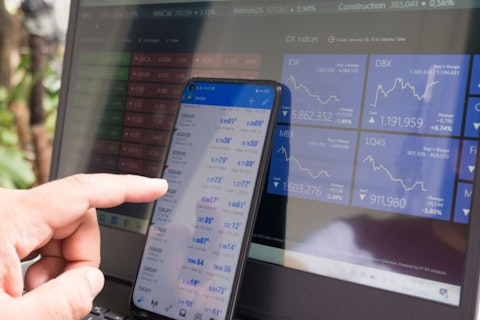Analysis: Wood’s ARK Slammed by Higher Interest Rates in 2022 Along with Other Growth Funds (Reuters)
Cathie Wood’s ARK Innovation Fund, which more than doubled during the pandemic rally, is on pace to finish near the very bottom of all U.S. mutual funds in 2022 after surging inflation and higher interest rates dried up appetite for high-growth shares. The ARK Innovation Fund has lost around 67% year to date, more than tripling the decline of the S&P 500 index (.SPX). Its tumble has made it the worst-performing among all 537 U.S. mid-cap growth funds and put it near the bottom of all U.S. equity funds tracked by Morningstar, according to the firm’s Dec. 16 ranking.
2 Magnificent Growth Stocks the Smartest Investors Are Buying Before the Next Bull Market (The Motley Fool)
Hedge fund managers with a history of achieving market-beating returns are buying these growth stocks. Even as the S&P 500 and the Nasdaq Composite dipped into a bear market this year, some of the smartest hedge fund managers out there weren’t dissuaded and kept buying growth stocks eagerly. Karthik Sarma of SRS Investment Management took a stake in Shopify (SHOP -1.36%) in the first quarter, and he built it into his fifth-largest position by the end of the third quarter. Meanwhile, David Shaw of D.E. Shaw & Company more than doubled his stake in The Trade Desk (TTD -2.67%) since the first quarter.
These Old-Fashioned Hedge Funds are Cashing in Like it’s the GFC (AFR.com)
Hedge funds trading bonds and currencies are on track for their best year since the global financial crisis, boosted by the steep interest rate rises that have inflicted heavy losses on equity specialists and mainstream investors. So-called macro hedge funds, made famous by the likes of George Soros and Louis Bacon, endured a barren period when markets were becalmed by trillions of dollars of central bank bond buying after 2008. But this year they have thrived thanks to seismic moves in global bond markets and a bull run in the dollar as the US Federal Reserve and other central banks battle soaring inflation. Among the winners have been billionaire trader Chris Rokos, who recovered from losses last year to gain 45.5 per cent in 2022, helped by bets on rising interest rates, including during the UK’s market turmoil in the autumn.

Photo by Marga Santoso on Unsplash
Why This Quant Fund Manager Thinks Value Stocks Are The Place To Be For Now (Forbes)
A few may have held out hope for a so-called “Santa rally” into the end of the year, but those hopes have failed to pan out. Historically, the last five trading days of December and the first two of January have been good for investors even though professional traders often take some days off during this period. A study conducted by LPL Research in 2020 found that the average return of the S&P 500 during those seven days is 78% more likely to be positive than during any other seven-day period. However, this has been a challenging month that capped a particularly difficult year for Wall Street.
Hedge Funds Got Their ‘Hedge’ Back in 2022: Morning Brief (AOL)
Hedge funds have garnered a bad rap in recent years, and rightfully so – performance has been lackluster and the exorbitant fees collected by firms have been hard to justify. Last year, hedge funds delivered broad-based annual returns of 10.3%, per the benchmark HFRI Fund Weighted Composite Index from Hedge Fund Research. The S&P 500 returned nearly 27% over the same period.
Bankman-Fried, FTX Execs Received Billions in Hidden Loans, Says Ex-Alameda CEO (The Straits Times)
NEW YORK – Sam Bankman-Fried and other FTX executives received billions of dollars in secret loans from the crypto mogul’s Alameda Research, the hedge fund’s former chief told a United States judge when she pleaded guilty to her role in the exchange’s collapse. Caroline Ellison, former chief executive of Alameda Research, said she agreed with Bankman-Fried to hide from FTX’s investors, lenders and customers that the hedge fund could borrow unlimited sums from the exchange, according to a transcript of her Dec 19 plea hearing that was unsealed last Friday.
Tuesday 12/27 Insider Buying Report: CRK (Nasdaq.com)
On Thursday, Jim L. Turner bought $208,690 worth of Comstock Resources, buying 15,000 shares at a cost of $13.91 a piece. Before this latest buy, Turner made one other purchase in the past twelve months, buying $917,195 shares at a cost of $18.34 a piece. Comstock Resources is trading off about 0.6% on the day Tuesday. So far Turner is in the green, up about 6.3% on their buy based on today’s trading high of $14.79.
Ex-Durham Donor Cuts Off University Cash to Fund Fight for Free Speech (Telegraph.co.uk)
A millionaire who was formerly Durham University’s largest donor said that he is cutting off all donations to universities and instead funding the fight for free speech on campuses. Mark Hillery, a retired hedge fund manager who donated more than £7 million to his alma mater between 2015 and 2021, told The Telegraph that he will not donate to any university again until “they get their free speech house properly in order”.
$10 Million Bet On This Healthcare Stock? Check Out These 3 Stocks Insiders Are Buying (Benzinga)
Dave & Buster’s Entertainment: The Trade: Dave & Buster’s Entertainment, Inc. (PLAY) 10% owner Scott Ross acquired a total of 535,000 shares an average price of $33.51. To acquire these shares, it cost around $17.93 million. Astria Therapeutics: The Trade: Astria Therapeutics, Inc. (ATXS) Director Joseph Edelman acquired a total of 908,265 shares at an average price of $11.01. To acquire these shares, it cost around $10 million.
SEC Adopts Amendments to Rule 10b5-1 Plan Requirements and Increases Disclosure Requirements Regarding Insider Trading Policies (NatlawReview.com)
On December 14, the Securities and Exchange Commission (SEC) unanimously adopted amendments to Rule 10b5-1 and related regulations governing “10b5-1 Plans.” 10b5-1 Plans enable (1) public company insiders to sell their company’s stock or (2) issuers to repurchase their shares, each at times when they otherwise might be prevented from doing so because they possess material non-public information (MNPI).





